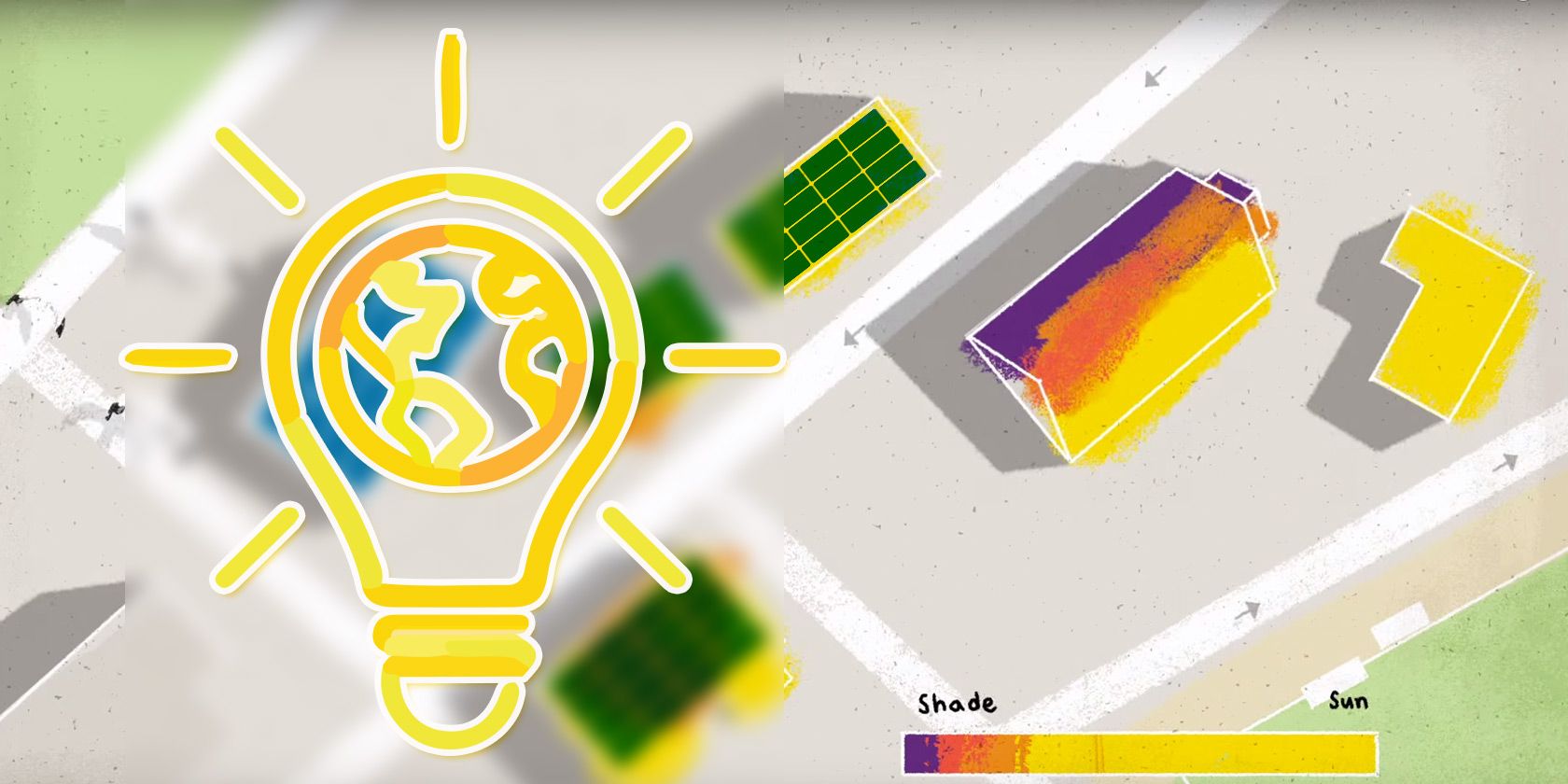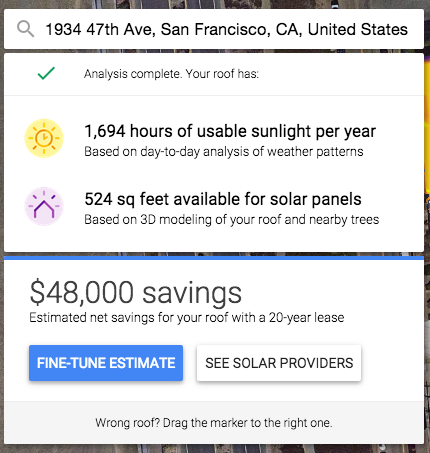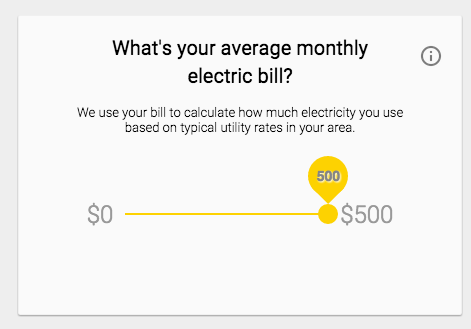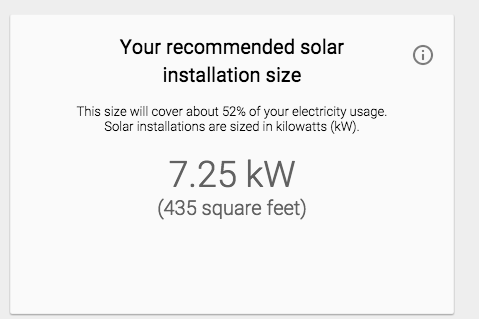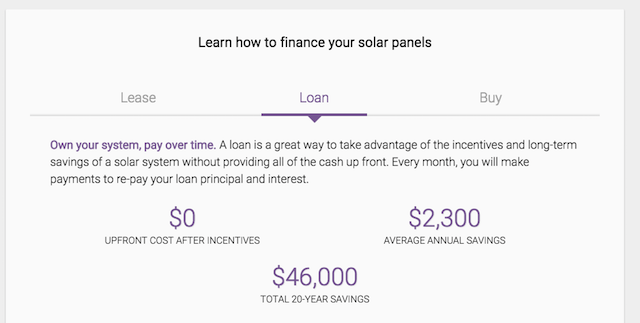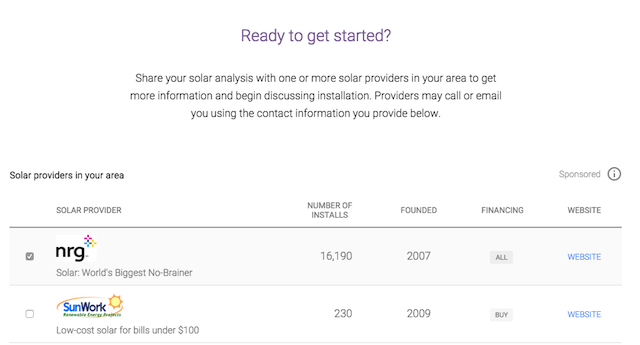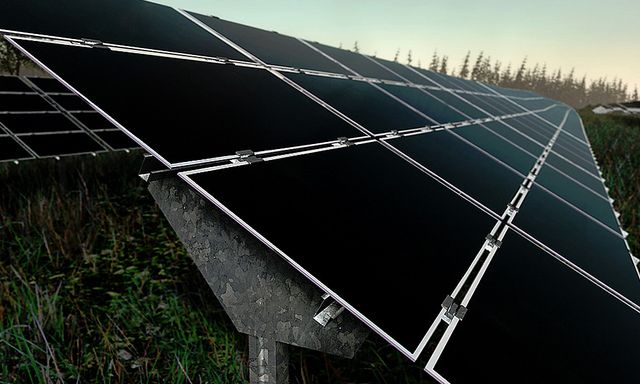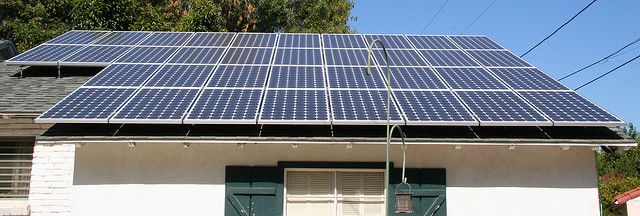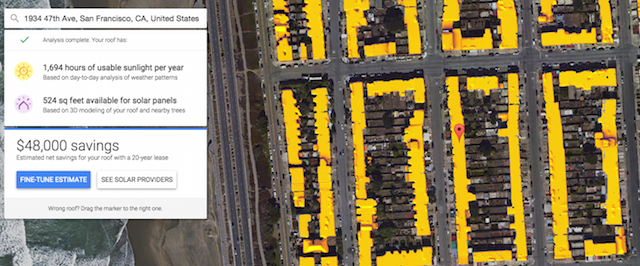Google Maps is an incredible tool. It can show you the world around you. It can show you the most direct route from A to Z in almost every country on earth. It can direct you to the best pizza place in town, and help you avoid traffic jams.
But can it save you money on your electricity bill?
Er, actually yes. Meet Project Sunroof. This neat idea was borne from one of Google's 20% projects - where engineers can dedicate one fifth of their time to their own interests and projects.
Simply put, Project Sunroof allows homeowners to estimate the benefits they'd reap from from installing solar panels. And it's dead easy too.
Practicing Project Sunroof
Right now, Project Sunroof is only available in a few select markets; the San Francisco Bay area, Fresno, and (bizarrely) Boston. The latter is, of course, not particularly well known for its year-round sunshine, and warm weather. Rather, its biting winters and a 75 foot snow pile that finally melted in June.
Project Sunroof aims to show consumers the potential savings that can come from owning photovoltaics by looking at their property, and performing calculations based upon geographical and weather data.
Not only does it show the average sunshine per year, but it also displays the square footage of roof that could potentially be covered with cells. These are then used to calculate the potential annual savings that can be had.
It even takes into account the orientation and placement of foliage and trees, weather conditions, and even the shade cast by nearby buildings. It's that good.
You can get a better idea of how much money you'd save by inputting your typical monthly electric bill.
From this, it can make an estimation of how large your solar cell installation should be.
It even breaks down the advantages of leasing, buying, and purchasing on finance a solar installation.
If that's persuaded you, Google can then put you in touch with selected solar companies who'll get in touch with a quote.
"A Solar Planel On Every Roof, On Every Building"
It's not hard to see why Google is so keen to get everyone onboard when it comes to solar power. They're huge fans of it, and have pumped hundreds of millions of dollars into building solar infrastructure worldwide.
Google are one of the biggest investors in Solar City, having dumped $280 million into the company to support the financing of small-scale solar projects throughout the US.
They're also one of the key financiers behind the Jasper Power Project. This 96 megawatt power station is located in Postmasburg, in South Africa's Kimberly, and is the biggest solar power plant in the entirety of Africa.
To use a startup term, Google "eats its own dog food". Their flagship campus in Mountain View, California is attached to a purpose-built, 1.9 megawatt solar power plant. This is so large, it can supply 30% of the Googleplex's power at peak times. That's pretty remarkable, given that Google have 11,000 of their 57,000 person workforce based there. That's almost a small town.
Not only do Google have a vested financial interest in furthering solar technology (particularly in the US where SolarCity operates), but they also have a deep philosophical interest.
They're a company that takes great efforts to emphasize their green credentials. They've even designed their sprawling, power-hungry datacenter to use almost 50% less power than traditional datacenters. Bringing their expertise in this field to the consumer feels very much like a no-brainer to me.
Why This Matters
For the longest time, solar technology has struggled to break into the mainstream. That's largely due to being remarkably expensive in terms of the initial costs and the relatively meagre electricity provided in return. In fact, they were only really commercially viable thanks to impressive government investments and subsidies.
These, for the most part, are either ending or already gone. But it's not all bad news for the consumer.
The Gigafactory - Elon Musk's battery factory extraordinaire - is about to get into full swing, producing affordable Lithium Ion batteries that'll be able to cheaply collect all the electricity that's produced during off-peak times.
We're about to see photovoltaic cells based on Perovskite hit the market, which promise to exponentially increase their efficiency from below 10%, to as much as 30%. They also promise to do it at a lower price-point too, by incorporating better manufacturing and design processes.
In short, we're seeing solar technology (and companion battery technology) become cheap and compelling enough, we may one day not need government subsidies.
But whilst this technology exists, there lacks a great marketing tool for it. Google Maps, with its near-universal reach and trusted status, could be enough to push consumers into finally taking the plunge and investing in their own solar cells. Especially when they see the potential financial windfall.
For Governments Too
I can see some useful applications for this within a government context, too.
The beauty of Project Sunlight is that it's cold, factual, and data driven. When used properly, it could help local government plan where best to invest in solar subsidies, by highlighting the places where they'd be most effective and where they wouldn't.
This could potentially make it easier for governments to sell solar subsidies to the electorate, particularly in countries where the masses are quite cynical about them, like in the UK, US and Spain.
In the UK especially, green energy subsidies have been blamed by the incumbent conservative government for the spiraling costs of energy. Perhaps Google Sunroof could make them a bit more palatable.
Project Sunroof Is Here
If you live in the few trial areas and you want to find out how much money you can save, click here.
Could this tool persuade you to invest in a new solar system? Still skeptical? I want to hear about it, either way. Drop me a line in the comments below.
Photo Credits: Solar power plant Kollbach (Michael Betke) [No Longer Available], Solar Panels All Done! (Mike Spassof)

